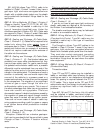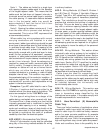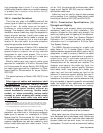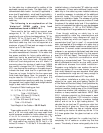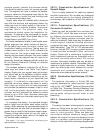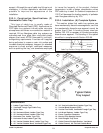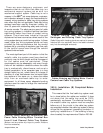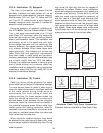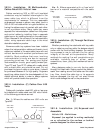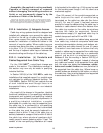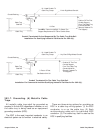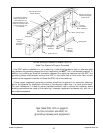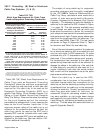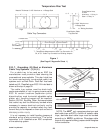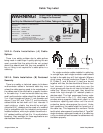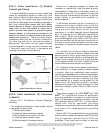
392.6. Installation. (E) Multiconductor
Cables Rated 600 Volts or Less.
Cables containing 300 or 600 volt insulated
conductors may be installed intermingled in the
same cable tray which is different from the
requirements for raceways. This is a reasonable
arrangement because a person may safely touch a
300 or 600 volt cable which is in good condition, so
having the cables come into contact with each other
is not a problem either. Many cable tray users
separate the instrumentation cables from the power
and control cables by installing them in separate
cable trays or by installing barriers in the cable trays.
Often, because of the volume of the instrumentation
cable, using separate cable trays is the most
desirable installation practice.
Numerous cable tray systems have been installed
where the instrumentation cables and branch circuit
cables are installed in the same cable trays with and
without barriers with excellent performance and
reliability. Most problems that occur involving
instrumentation circuits are due to improper
grounding practices. For analog and digital
instrumentation circuits, good quality twisted pair
Type ITC and Type PLTC cables with a cable shield
and a shield drain wire should be used. Do not
purchase this type of cable on price alone, it should
be purchased because of it's high quality. Engineers
specifying cables should be knowledgeable of the
cable's technical details in order to design systems
which will provide trouble free operation.
392.6. Installation. (F) Cables Over 600
Volts.
Cables with insulation rated 600 volts or less may
be installed with cables rated over 600 volts if either
of the following provisions are met.
No. 1: Where the cables over 600 volts are
Type MC.
No. 2: Where separated with a fixed solid
barrier of a material compatible with the cable
tray.
392.6. Installation. (G) Through Partitions
and Walls.
Whether penetrating fire rated walls with tray cable
only or cable tray and tray cable, the designer should
review with the local building inspector the method
he proposes to use to maintain the fire rating
integrity of the wall at the penetration. Many
methods for sealing fire wall penetrations are
available, including bag or pillow, caulk,
cementitious, foam, putty and mechanical barrier
systems.
Many designers prefer to run only the tray cable
through fire rated walls. Sealing around the cables is
easier than sealing around the cables and the cable
tray. Also, should the cable tray or its supports
become damaged, the tray will not exert forces
which could damage the wall or the penetration.
392.6. Installation. (H) Exposed and
Accessible.
Article 100 - Definitions.
Exposed: (as applied to wiring methods)
on or attached to the surface or behind
panels designed to allow access.
24
Cooper B-Line, Inc Cable Tray Manual
300 & 600
Volt Cables
Fixed Solid Barrier
Comparable Material
Cables Rated
Over 600 Volts
NO. 2
300 & 600
Volt Cables
Cables Rated Over
600 Volts Are Type MC
NO. 1



